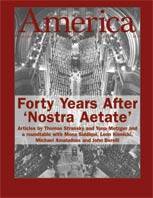The Latin words nostra aetate mean “in our time,” a fitting opening phrase for the declaration promulgated by the Second Vatican Council in 1965 that has truly transformed our time. In Nostra Aetate the Catholic Church accepted that those of different faith communities, the “others,” were persons of God, engaged in a meaningful relationship with God. This groundbreaking document was a turning point in the relationship between Catholics and Jews, which had been marred by centuries of persecution and blame.
In 1974 and 1985, the Vatican Commission for Religious Relations with the Jews issued documents expounding the meaning of Nostra Aetate and the obligations that flow from it: the “Guidelines and Suggestions for Implementing the Conciliar Declaration Nostra Aetate” and “Notes on the Correct Way to Present the Jews and Judaism in Preaching and Catechesis in the Roman Catholic Church.” These documents from the Holy See offered encouragement to ongoing Catholic-Jewish dialogue in the United States and other countries to develop educational programs and revise educational materials and litugucal texts so they could not be misunderstood or used as a pretext for anti-Semitism.
In the decades since Nostra Aetate, Catholic and Jewish leaders and clergy have reached out to each other. They have held meetings all over the world, working together to build trust and understanding between their communities and to address issues of economic and social injustice. Their efforts have had some effect at the pew level, but not enough. This era of what I call “interfaith tea and sympathy” was important, as it enabled us to begin to really know and accept each other as people of faith. Today, however, we are ready to move further.
What is missing after 40 years of Nostra Aetate is a joint theological consideration of the specific matters that affect us spiritually. The time has come for an interfaith theological conversation, a methodology in search of the meaning of the encounter itself, touching the very essence of our commitments through the process of sharing our perceptions of God. Without such a theological component, interfaith dialogue will never move forward. It will stagnate as encounters of good will, cordiality without substance.
A theological dialogue between Catholics and Jews encompasses the firm understanding that our individual faith commitments are sacred. There can be no question of proselytizing or syncretism. Our separate beliefs are the numinous dimensions of a God-person-community relationship that must be honored and respected by all involved in interfaith theological dialogue.
Theological exchange does not lessen one’s own religious beliefs or vocation. Rather, it can lead to a deepening of an individual’s particular commitment to God and personal spirituality. Equality and mutual recognition are essential to theological dialogue and are the hallmarks of the Interfaith Theological Forum at the Pope John Paul II Cultural Center in Washington, D.C.
Established in 2004, I.T.F. brings Jews and Catholics together for theological discussions that increase awareness of our similarities and differences in order to expand our appreciation of the other’s unique path to God. Forty years of Nostra Aetate have prepared us for this next, crucial step in Jewish-Catholic relations. It is my hope and prayer that through mutual theological consideration, the next 40 years will strengthen our covenantal relationships with God to improve the human condition and create a better world.








